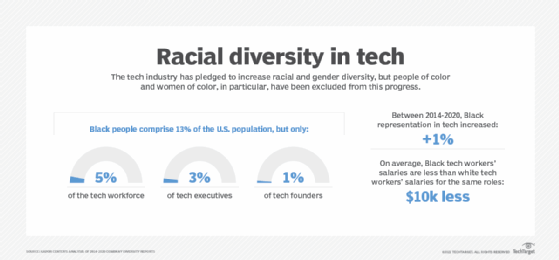8 critical talent acquisition and recruitment trends in 2024
The rise of AI, remote work issues, and competency-based hiring are just a few of the trends recruiters and talent acquisition teams must contend with in 2024.
The 2020s are proving to be a tough time to be a recruiter.
In recent years, recruiters and HR leaders faced never-before-imagined challenges as COVID-19 disrupted workplaces, talent shortages grew, global uncertainties multiplied, and ChatGPT raised a host of questions about technology's future role. HR teams will continue to face challenges in the year ahead as they figure out how to use AI tools, how to attract and retain new employees, and how to navigate the tricky issues that a hybrid workforce brings. Understanding important trends in talent acquisition and recruitment -- and where HR technology fits in -- is key to staying competitive.
For example, diversity and inclusion and employee wellbeing continue to be critical issues, while the popularity of analytics in HR is spreading to talent acquisition as well. Companies must also focus on candidate experience or risk losing candidates.
Learn more about the ongoing and emerging 2024 recruitment trends.
1. Artificial intelligence
One of the fastest-growing areas in talent acquisition software is AI. Examples include smart talent platforms, job-posting platforms, chatbots and natural language processing (NLP).
Unlike robotic process automation (RPA), which performs manual, repetitive tasks, AI can carry out activities such as reviewing resumes for specific skills. When combined with RPA, AI can help recruiters review job boards and read and process documents. The rise of ChatGPT has led to several companies adding capabilities to their recruiting software such as interview question generation.
Recruitment chatbots can help engage candidates and provide more details about job postings, while NLP helps users compose job postings, offers tips to make postings more attractive to candidates and improves chatbot response accuracy.
Machine learning can help make the software more effective by learning from users' activity.
2. Employer branding
Employer branding emerged as a prominent recruitment trend in recent years and continues to serve as a key differentiator for companies of any size in a competitive job market.
Many job seekers are looking for employers who align with their personal values and offer a fulfilling work experience, and some candidates may be looking for remote work options or career development opportunities. In addition, online employer review platforms make it easier for candidates to learn about a company's culture and working conditions.
A strong employer brand can affect a company's ability to attract top talent, reduce turnover and improve employee engagement. Many companies are currently investing in their employer brand through strategies such as employee testimonials and a strong social media presence.
3. Employee well-being
Employee well-being continues to be a central focus for recruitment as HR leaders recognize the vital role it plays in attracting and retaining top talent.
In today's competitive job market, candidates are not only looking for competitive salaries and benefits but also for prioritization of employee physical and mental health. Many companies are responding by adopting a holistic approach to employee well-being and focusing on factors such as work-life balance, mental health support, physical wellness programs, and a supportive, inclusive work culture.
This trend was amplified by the COVID-19 pandemic and the subsequent Great Resignation and continues to affect employee recruitment.
4. Candidate experience
The pandemic led to a focus on employee experience, accelerating the need for employee listening programs and an emphasis on employee well-being, and the trend has continued. The need for companies to provide a good experience also extends to candidates.
Job seekers want to feel treated well by recruiters and by technology. Candidates want career sites that are easy to use and let them quickly set up a profile, search for jobs and apply. Many companies are upgrading their career sites to enable a fast and easy application experience and soliciting feedback from candidates.
The candidate experience continues after a job seeker completes the application. Candidate communication, such as scheduling interviews and following up, is another important aspect that recruiters must focus on. Recruitment software can help personalize the hiring process and gather analytics to help organizations improve their candidate experience.
5. Diversity and inclusion
Companies' diversity and inclusion initiatives also affect talent acquisition and recruitment. Organizations with a diverse workforce are more productive and profitable, and more inclusive hiring continues to be a focus for many organizations.
Some AI software promises to help companies meet their diversity and inclusion goals, but the federal government has been raising concerns over the potential of AI bias when evaluating candidates. Companies should use caution and carefully evaluate recruiting software with AI capabilities.

6. Analytics
Many HR departments are rapidly adopting analytics, and it remains a major trend that will affect how organizations define their talent acquisition strategies and recruit talent. Applying analytics to talent acquisition processes can help identify areas for improvement, improve decision-making and reduce talent acquisition costs.
Analytics can provide recruiters with metrics such as the following:
- Source of hire.
- Time to fill.
- Time to hire.
- Age of job (how long a job was open).
- Offer acceptance rate.
- Cost per hire.
- Vacancy cost (the cost to the organization while a position remains vacant).
- Diversity and inclusion-related metrics.
Predictive analytics is also on the rise, and it can help recruiters forecast future trends such as predicted time to fill and interview acceptance probability.
Most recruiting software now includes trend identification and visualization as well as predictive analytics.
7. Remote work evolution
The evolution of remote work fundamentally transformed the recruitment landscape. Over the past few years, remote work shifted from being a perk or industry-specific way of working to a mainstream employment model, which opened up new opportunities for job seekers and employers and resulted in candidates increasingly seeking positions that offered remote or hybrid work arrangements.
However, return-to-work mandates from many companies have recently affected remote work availability, with mentions of remote and hybrid work opportunities recently declining in tech job postings.
Organizations that are continuing their remote work arrangements are focusing on implementing strategies to ensure that remote team members feel connected and supported.
8. Skills, competencies and other attributes
Assessing skills and competencies and using them to source, screen and match candidates to open vacancies is becoming increasingly popular because of AI's capabilities.
Although HR has analyzed skills and competencies as part of talent management for quite some time, particularly when identifying successors for key positions, organizations have not always effectively used skills and competencies for talent acquisition. Recruiters should consider soft skills, such as time management and critical thinking, as well as hard skills.
Some HR software vendors are now including employee attributes such as interpersonal skills, aspirations and motivations in their systems across a variety of processes.
Luke Marson is a principal architect and part of the management team of a global SAP SuccessFactors consulting partner, where he focuses on SuccessFactors Employee Central, extensibility and integration technologies.







